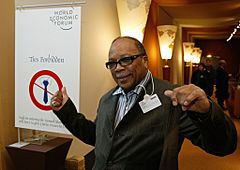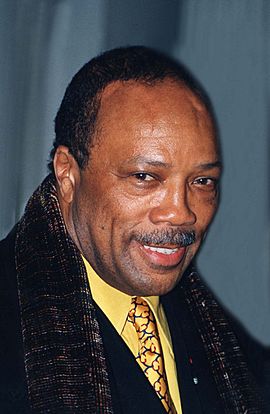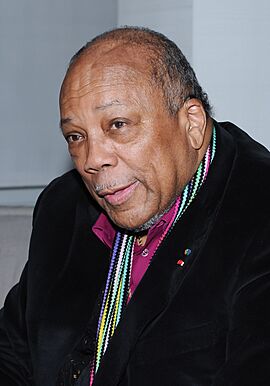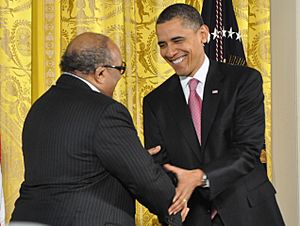Quincy Jones facts for kids
Quick facts for kids
Quincy Jones
|
|
|---|---|
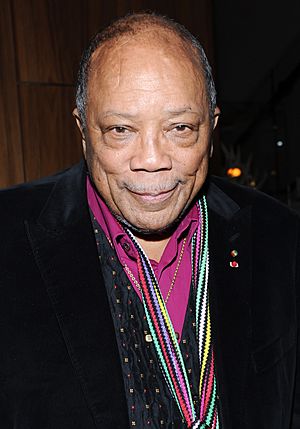
Jones in 2014
|
|
| Born |
Quincy Delight Jones Jr.
March 14, 1933 Chicago, Illinois, U.S.
|
| Died | November 3, 2024 (aged 91) Bel Air, California, U.S.
|
| Occupation |
|
| Years active | 1951–2024 |
| Spouse(s) |
|
| Partner(s) | Nastassja Kinski (1992–1995) |
| Children | 7, including Quincy III, Kidada, Rashida and Kenya |
| Relatives | Richard A. Jones (half-brother) |
| Awards | Full list |
| Musical career | |
| Genres | |
| Instruments | Trumpet |
| Labels |
|
Quincy Delight Jones Jr. (March 14, 1933 – November 3, 2024) was an amazing American record producer, songwriter, and composer. He was also a conductor, arranger, and film and television producer. His career lasted over 70 years! He won an incredible 28 Grammy Awards and was nominated 80 times. He even received a special Grammy Legend Award in 1992.
Quincy Jones first became famous in the 1950s for arranging and conducting jazz music. He then started working on pop music and film scores. He was very good at moving between different music styles. For example, he produced hit pop songs for Lesley Gore in the early 1960s, like "It's My Party." He also worked with jazz legends like Frank Sinatra and Count Basie.
In 1968, Quincy Jones made history as the first African American to be nominated for an Academy Award for Best Original Song. This was for "The Eyes of Love" from the movie Banning. He was also nominated for an Academy Award for Best Original Score for In Cold Blood in the same year. This made him the first African American to receive two Oscar nominations at once!
Jones produced three of the most successful albums for pop superstar Michael Jackson. These were Off the Wall (1979), Thriller (1982), and Bad (1987). In 1985, he produced and conducted the famous charity song "We Are the World." This song raised money to help people affected by famine in Ethiopia.
In 1971, Jones became the first African American to be the musical director and conductor for the Academy Awards. Later, in 1995, he received the academy's Jean Hersholt Humanitarian Award. This award is given to people in the film industry who have done great humanitarian work. He is tied as the second most Oscar-nominated African American, with seven nominations. In 2013, Jones was honored by being inducted into the Rock & Roll Hall of Fame. Time magazine called him one of the most important jazz musicians of the 20th century.
Contents
Early Life and Musical Beginnings
Quincy Delight Jones Jr. was born in Chicago on March 14, 1933. His mother, Sarah Frances, was a bank officer. His father, Quincy Delight Jones, was a carpenter and semi-professional baseball player. Quincy's family moved to Chicago during the Great Migration.
Quincy's mother loved to sing religious songs, which introduced him to music. His neighbor, Lucy Jackson, played the piano, and Quincy would listen through the walls. He loved music from a very young age.
When Quincy was young, his family moved to Bremerton, Washington, in 1943. His father worked at the Puget Sound Naval Shipyard. After the war, they moved to Seattle. There, Quincy went to Garfield High School. He became very good at playing the trumpet and arranging music. He even played with a band at age fourteen.
At 14, Quincy met 16-year-old Ray Charles after watching him play. Ray Charles became a big inspiration for Quincy. Jones admired how Charles achieved his musical goals despite being blind. Quincy also learned a strong work ethic from his father. His father's motto was: "Once a task is just begun, never leave until it's done. Be the labor great or small, do it well or not at all."
In 1951, Jones received a scholarship to Seattle University. He later transferred to the Berklee College of Music in Boston. He left college when he got an offer to tour as a trumpeter and arranger with bandleader Lionel Hampton. This was the start of his professional music career. He moved to New York City and wrote music for famous artists like Ray Charles, Sarah Vaughan, and Duke Ellington.
Building a Music Career
In 1953, at age 20, Jones toured Europe with Lionel Hampton's jazz orchestra. This trip changed his view of the world. He saw that conflicts happened everywhere, not just between black and white people in the United States. This experience broadened his mind.
In 1956, Jones worked on a TV show called Stage Show. He played trumpet in the band that supported 21-year-old Elvis Presley in his first TV appearances. Soon after, Jones toured the Middle East and South America as a trumpeter and musical director for Dizzy Gillespie.
After returning, he signed with ABC-Paramount and began recording his own music. In 1957, he moved to Paris to study music and perform. He became the music director for Barclay, a French record company.
During the 1950s, Jones toured Europe with jazz orchestras. He formed his own big band, the Jones Boys, with eighteen musicians. The band was very talented and received great reviews. However, it was too expensive to keep going, and the band had to break up. This taught Jones an important lesson. He realized there was "music" and the "music business." He knew he had to learn the difference to succeed.
Irving Green, the head of Mercury Records, helped Jones. He gave him a loan and a job as musical director for Mercury's New York office.
Breakthrough Success
In 1961, Jones became the vice-president of Mercury Records. He was the first African American to hold such a high position. That same year, he started composing music for films, beginning with The Pawnbroker (1964). This was the first of nearly 40 movie scores he would create.
After the success of The Pawnbroker, Jones moved to Los Angeles. He became very popular as a film composer. Over the next seven years, he composed music for many movies, including In Cold Blood, In the Heat of the Night, and The Italian Job. He also composed "The Streetbeater", the theme music for the TV show Sanford and Son. He wrote themes for other TV shows like Ironside and The Bill Cosby Show.
In the 1960s, Jones arranged music for many famous singers. These included Ella Fitzgerald, Frank Sinatra, and Sarah Vaughan. His own albums included Walking in Space and Body Heat. His 1962 song "Soul Bossa Nova" was later used as the theme for the 1997 movie Austin Powers: International Man of Mystery.
Jones produced all four of Lesley Gore's million-selling songs in the 1960s. These hits included "It's My Party" and "You Don't Own Me".
In 1975, Jones started his own company, Qwest Productions. He produced successful albums for artists like Frank Sinatra. In 1978, he produced the soundtrack for The Wiz, a musical movie starring Michael Jackson and Diana Ross. In 1982, he produced Jackson's Thriller. Thriller became the best-selling album in music history.
His 1981 album The Dude had popular songs like "Ai No Corrida" and "Just Once."
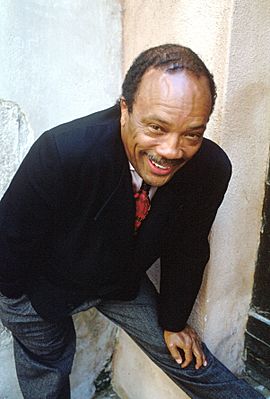
In 1985, Jones made his debut as a film producer with The Color Purple. The movie received 11 Oscar nominations. Jones also introduced Whoopi Goldberg and Oprah Winfrey to film audiences through this movie.
After the 1985 American Music Awards, Jones gathered many top American recording artists. They recorded the song "We Are the World" to help famine victims in Ethiopia. Jones famously told everyone to "Check Your Ego at the Door." He also asked them to wear casual clothes, saying, "We don't want to make a hunger record in tuxedos."
In 1990, Quincy Jones Productions teamed up with Time Warner to create Quincy Jones Entertainment (QJE). This company produced the successful TV show The Fresh Prince of Bel-Air, which helped discover Will Smith. QJE also produced MADtv, a sketch comedy show that ran for 14 seasons.
In 1991, Jones convinced Miles Davis to perform music from his classic albums. Davis had always refused to revisit the past. The recording, Miles & Quincy Live at Montreux, was Davis's last album before he passed away.
In 2001, Jones published his autobiography, Q: The Autobiography of Quincy Jones. He continued to produce albums for new artists like Emily Bear and Jacob Collier. In 2010, he co-founded Playground Sessions, a company that teaches people to play piano using interactive videos.
In 2017, Jones launched Qwest TV, a streaming service for jazz and other music from around the world.
Working with Frank Sinatra
Quincy Jones first worked with Frank Sinatra in 1958. Six years later, Sinatra hired him to arrange and conduct his album with Count Basie, It Might as Well Be Swing (1964). Jones also conducted Sinatra's live album, Sinatra at the Sands (1966).
Jones worked with Sinatra for many years. He said, "Frank Sinatra took me to a whole new planet. I worked with him until he passed away in '98. He left me his ring. I never take it off."
Working with Michael Jackson
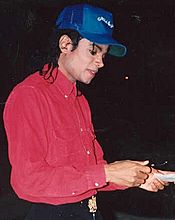
While working on the movie The Wiz, Michael Jackson asked Jones to suggest producers for his next album. Jones offered to produce it himself. Jackson agreed, and their first album together, Off the Wall, sold about 20 million copies.
Their next project, Thriller, sold an incredible 65 million copies. It became the highest-selling album of all time. The rise of MTV and music videos helped Thriller's sales. Jones also worked on Jackson's album Bad, which sold 45 million copies. This was their last collaboration.
After Michael Jackson's passing in 2009, Jones shared his feelings: "I am absolutely devastated at this tragic and unexpected news. For Michael to be taken away from us so suddenly at such a young age, I just don't have the words. Divinity brought our souls together on The Wiz and allowed us to do what we were able to throughout the '80s. To this day, the music we created together on Off the Wall, Thriller and Bad is played in every corner of the world, and the reason for that is because he had it all ... talent, grace, professionalism, and dedication. He was the consummate entertainer, and his contributions and legacy will be felt upon the world forever. I've lost my little brother today, and part of my soul has gone with him."
Media Appearances
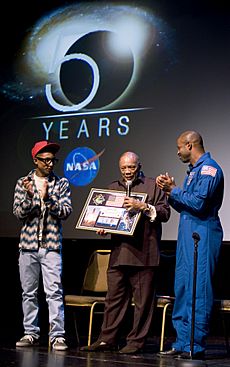
Jones appeared in music videos with Ray Charles and Chaka Khan. He also hosted an episode of Saturday Night Live in 1990, which featured many musical guests. He later produced his own sketch comedy show, FOX's MADtv.
In 1999, Jones appeared in the Walt Disney Pictures animated film Fantasia 2000. He introduced the segment featuring George Gershwin's Rhapsody in Blue. He also made a small appearance as himself in the movie Austin Powers in Goldmember (2002).
In 2014, Jones appeared in Keep on Keepin' On, a documentary about his friend, jazz trumpeter Clark Terry. Jones signed Terry's protégé, Justin Kauflin, to his band and label. In 2016, he and Pharrell Williams presented Ennio Morricone with an Oscar for best film score.
Activism and Philanthropy
Quincy Jones started his social activism in the 1960s, supporting Martin Luther King Jr.. He helped create the Institute for Black American Music (IBAM). This organization works to raise money for a national library of African-American art and music. Jones also helped start the Black Arts Festival in Chicago.
In the 1970s, Jones created the Quincy Jones Workshops. These workshops helped young people in inner cities develop their skills in music, acting, and songwriting.
For many years, Jones worked with Bono of U2 on many charity projects. He founded the Quincy Jones Listen Up Foundation. This nonprofit organization has built over 100 homes in South Africa. It also helps connect young people with technology, education, culture, and music. One of its programs helps underprivileged youth from Los Angeles and South Africa connect through cultural exchange.
In 2004, Jones helped launch the We Are the Future (WAF) project. This project helps children in poor and conflict-ridden areas have a better childhood and feel hopeful. The program works with the World Bank and UN agencies.
Jones supported many other charities, including the NAACP and GLAAD. He also worked with the Jazz Foundation of America to help elderly jazz and blues musicians. He is a spokesperson for the Global Down Syndrome Foundation.
Personal Life
Quincy Jones never learned to drive a car. He said this was because of a car crash he was in when he was 14 years old.
In 1974, Jones had a serious health issue called a brain aneurysm. This made him decide to work less and spend more time with his friends and family. He had two brain surgeries. After the second surgery, doctors told him he should never play the trumpet again. They warned that if he blew the trumpet, it could cause serious problems. He tried to ignore the advice, but after a concert in Japan, he had a severe headache. Doctors confirmed the risk, and Jones never played the trumpet again.
Jones was married three times and had seven children. He had a daughter named Jolie with his first wife, Jeri Caldwell. He had another daughter named Rachel. With his second wife, Ulla Andersson, he had a daughter named Martina and a son named Quincy, who also became a music producer. With his third wife, Peggy Lipton, he had two daughters, Kidada and Rashida, both of whom became actresses. He also had a daughter named Kenya with Nastassja Kinski.
Legacy
Quincy Jones had a huge impact on music around the world. He was a close friend and partner to many Brazilian musicians, including Simone, Ivan Lins, and Milton Nascimento.
The famous Japanese composer Mamoru Fujisawa, known as 'Joe Hisaishi,' chose his stage name as a tribute to Quincy Jones. 'Hisaishi' is the Japanese equivalent of 'Quincy.'
Awards and Honors
- Honorary Doctorate of Music from Berklee College of Music (1983)
- Golden Plate Award of the American Academy of Achievement (1984)
- Grammy Legend Award in 1992 (one of only 15 people ever to receive it)
- He is third in the list of all-time Grammy award wins.
- Garfield High School in Seattle named a performing arts center after him.
- Quincy Jones Elementary School in Los Angeles is named after him.
- Humanitarian Award at the BET Awards in 2008.
- John F. Kennedy Center Honors in 2001.
- National Medal of Arts from President Barack Obama on March 2, 2011.
- Los Angeles Press Club Visionary Award in 2014.
- Honorary doctorate from the Royal Academy of Music, London, in 2015.
- Ahmet Ertegun Award in the Rock and Roll Hall of Fame in 2013.
- In 2021, Jones was inducted into the Black Music and Entertainment Walk of Fame.
Discography
Film Scores and Soundtracks
- The Pawnbroker (1965)
- Mirage (1965)
- The Slender Thread (1965)
- Walk, Don't Run (1966)
- "Hey Landlord Theme" (1966–67) in Hey Landlord TV series
- The Deadly Affair (1967)
- Enter Laughing (1967)
- Banning (1967)
- In the Heat of the Night (1967)
- In Cold Blood (1967)
- A Dandy in Aspic (1968)
- The Counterfeit Killer (1968)
- Jigsaw (1968)
- For Love of Ivy (1968)
- The Hell with Heroes (1968)
- The Split (1968)
- Mackenna's Gold (1969)
- The Italian Job (1969)
- The Lost Man (1969)
- Bob & Carol & Ted & Alice (1969)
- John and Mary (1969)
- Original Sound Track: Cactus Flower (1969) from Cactus Flower (1969)
- Last of the Mobile Hot Shots (1970)
- The Out-of-Towners (1970)
- Original Motion Picture Score: They Call Me Mister Tibbs! (1970) from They Call Me Mister Tibbs! (1970)
- Brother John (1971)
- The Anderson Tapes (1971)
- Honky (1971)
- "Sanford and Son Theme" in Sanford and Son
– included in You've Got It Bad Girl (1973) - Dollars (1972) from Dollars (1971)
- The Hot Rock (1972)
- The New Centurions (1972)
- "Love Theme From The Getaway" (1973) in The Getaway (1972)
– included in You've Got It Bad Girl (1973) - Roots: The Saga of an American Family (1977) from Roots (1977)
- The Wiz original soundtrack (1978) from The Wiz (1978)
- The Color Purple: Music From the Motion Picture (1986) from The Color Purple (1985)
- Lola (2024)
Filmography
- Fantasia 2000 (1999) – Himself (segment "Rhapsody in Blue")
- Austin Powers in Goldmember (2002) – Himself
- Sandy Wexler (2017) – Himself
- Quincy (2018) – Himself
- The Black Godfather (2019) – Himself
- Jay Sebring....Cutting to the Truth (2020) – Himself
See also
 In Spanish: Quincy Jones para niños
In Spanish: Quincy Jones para niños
 | Bessie Coleman |
 | Spann Watson |
 | Jill E. Brown |
 | Sherman W. White |



